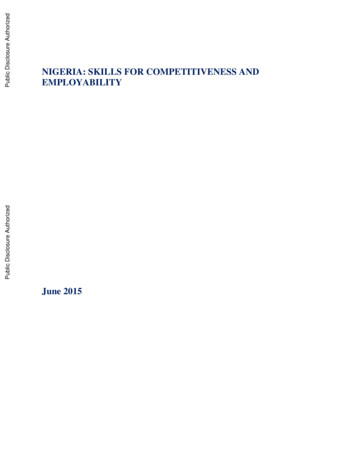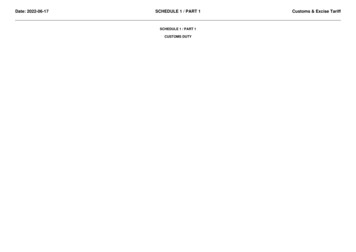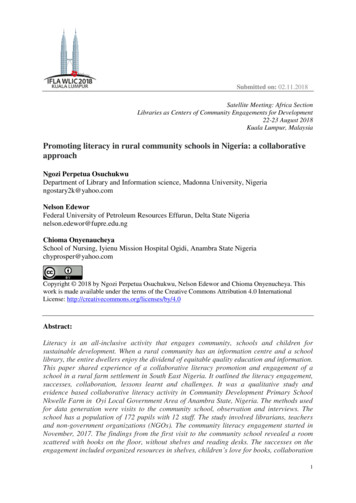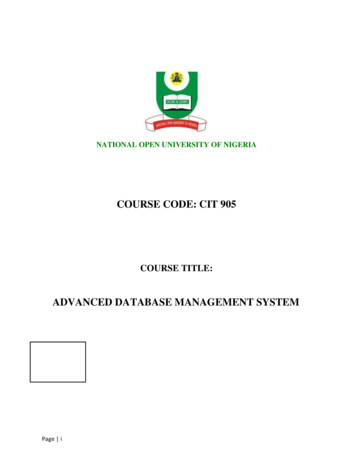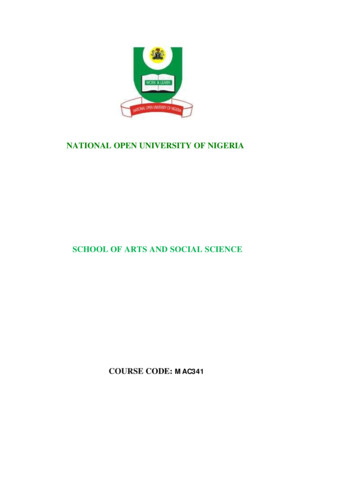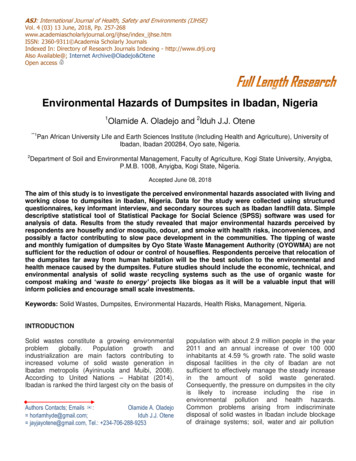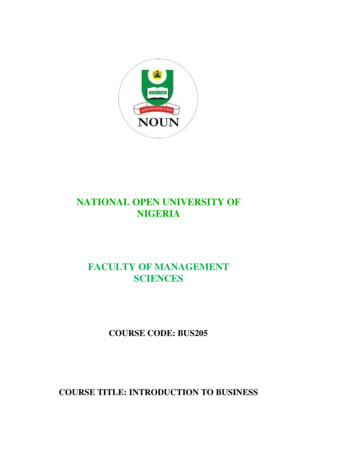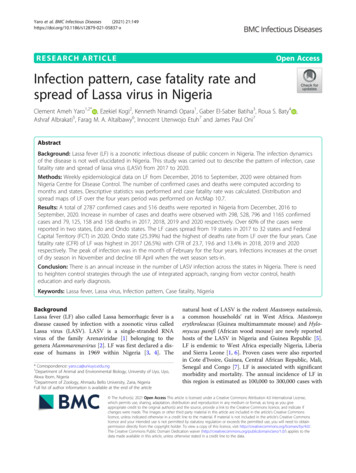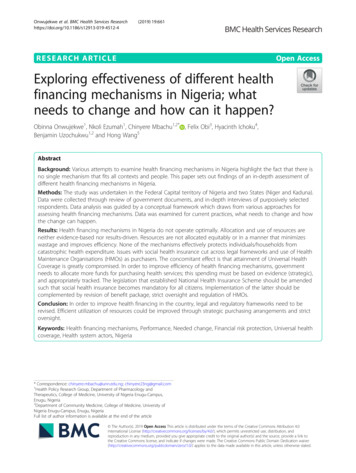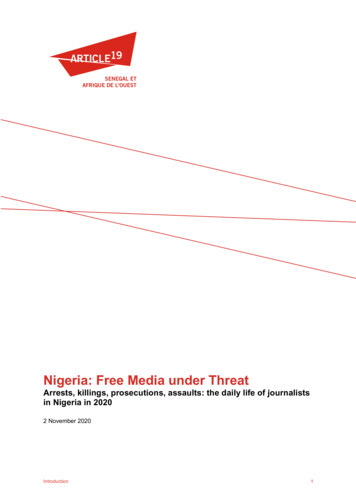
Transcription
Nigeria: Free Media under ThreatArrests, killings, prosecutions, assaults: the daily life of journalistsin Nigeria in 20202 November 2020Introduction1
CONTENTSIntroduction3Escalation of the crackdown on journalists4Repressive and unconstitutional laws threaten the work of journalists6Legal framework overviewArrests and prosecutions of journalists67Nigeria's international obligations to protect journalists8Recommendations9Introduction2
INTRODUCTIONBetween January and October 2020, ARTICLE 19 documented a huge increase in assaults,arrests and prosecution of the press in Nigeria compared to last year, with 51 incidents in 2020alone, affecting 60 journalists. The security forces and government officials were responsiblefor the majority of attacks, while eight attacks were by unknown attackers and six by politicalthugs.This data is based on a combination of daily monitoring of reports of such violations, interviews withjournalists and victims of attacks, and interviews with non-governmental organisations (NGOs) inNigeria who monitor freedom of expression and the media.ARTICLE 19 is calling on the government to cease these attacks, protect journalists and to conductindependent investigations to hold perpetrators accountable. Nigeria should set up a panel toinvestigate all the attacks against journalists as well as all cases of arrest and prosecution and reviewthe legislation that is being used to stifle the media, such as the cybercrime act. The government mustimmediately release all journalists that are currently in detention for doing their work. The organisationfurther urges the government of Nigeria to ensure that all media professionals are allowed to operateindependently and do their job freely without any fear of reprisal.ARTICLE 19 calls on the United Nations Special Rapporteurs of freedom of expression and opinionand on extrajudicial killings and the African Commission and Human and Peoples' Rights SpecialRapporteur on freedom of expression and information to urge the Nigerian government to investigatethese crimes and issue a joint recommendation, provide support for its implementation and monitorthe progress.This briefing builds on ARTICLE 19's broader concerns about the deteriorating space of civic space inNigeria.In May ARTICLE 19 released a statement1 jointly with other organisations urging the authorities toinvestigate the allegations of unlawful killings of at least 21 persons, other acts of violence andintimidation of journalists which have occurred in the context of Nigeria's COVID-19 lockdown. In June, we wrote to the UN and African Commission Special Rapporteurs on Freedom ofExpression2 to ask them to call on the government to place a moratorium on the use ofcybercrimes legislation and reform the legislation. In August, ARTICLE 19 released a joint statement3 with three other organisations, warning of thedeteriorating civic space and urging the Nigerian government to release anyone who is detainedsolely for exercising their right to free speech and amend any laws that are not in line withNigeria's international human rights obligations. In October, ARTICLE 19 urged the authorities4 to stop attacks on peaceful protesters andinvestigate all unlawful killings and excessive use of force. s-legislation/3 orating-civic-space/4 he-killings-of-protesters/2Introduction3
ESCALATION OF THE CRACKDOWN ONJOURNALISTSJournalists play a vital role in society as a watchdog, revealing crucial information that contributes toholding the government accountable. But they also face immense challenges in the performance oftheir duty. In Nigeria, they are often victims of assaults, verbal threats, intimidation, seizure ofequipment or even imprisonment. These attacks constitute a real threat to freedom of expression andmedia freedom.The data documented by ARTICLE 19 through the period of January to October 2020 revealed theincrease in attacks against journalists: In total, 60 journalists were affected in 51 incidents.Three journalists have been killed: one by security forces during a protest in Abuja and two byunknown persons in Adamawa and Nasarawa states.Thirty-four journalists have been victims of assaults, including two female journalists. The assaultstook place across the country, including in Lagos, Ondo, Osun, Abia, Anambra, Bauchi, Edo andRivers states and the Federal Capital Territory (FCT)Eighteen of the 34 journalists were assaulted for covering the nationwide #ENDSARS protestsagainst police brutality in October 2020. In ten cases, the police were the perpetrator.Twelve journalists have been arrested. Half of them were released after a few days, but six werecharged to court, mostly under the Terrorism or Cybercrime act.Three journalists were denied access to perform their work.Three media outlets have been attacked.Four media outlets were fined for their coverage.In addition, ARTICLE 19 received reports that countless other journalists have faced issues likeequipment seizure or damages, intimidation and death threats.This trend more than doubled in 2020; compared to the same period in 2019, at least 19 journalists5and media professionals suffered attacks, including arrests, detention, assaults, threats, and seizureof equipment. Some of the 2020 cases include: On 26 October, the National Broadcasting Commission fined three television stations, namelyChannels Television, Arise Television and Africa Independent Television, each N3 million for"unprofessional coverage" of the end SARS protests.On Sunday 11 October 2020, a journalist working for Premium Times was assaulted by police6officers while covering the #EndSARS protest in Abuja. The journalist was chased and beaten byPolice officers.On 1 October in Lagos State, a police officer hit a photojournalist working for PUNCH Newspaperon his head with a baton. A colleague of the journalist who witnessed the attack said that thejournalist collapsed and blood gushed out of his injured head. The Commissioner of Police inLagos apologised for the attack and promised to hold the perpetrators accountable.On 10 September the police in Lagos had arrested four journalists,7 alongside 14 protesters,during a peaceful protest. They were later released.On 3 August, at least four police officers slapped, kicked, and used their batons to beat acorrespondent8 of the privately-owned Daily Post newspaper. The journalist was reporting onofficers' enforcement of COVID-19 restrictions in Old Garage, a suburb of the western OsunState's capital ml7 s-for-covering-protest.html8 -19-lockdown/6Escalation of the crackdown on journalists4
On 21 January, a reporter and editor with the local independent outlet Regent Africa Times diedfrom head injuries sustained at a protest in Abuja9, the capital, held by members of the IslamicMovement of Nigeria religious organisation. Witnesses claimed that police opened fire atprotesters and a bullet hit Ogbu in the head.Archibong Jeremiah Ojanga, Managing Editor of CrossRiverWatch and Secretary Association ofCross River Online Journalists (ACROJ), expressed his disappointment and concerns about theshrinking space for media in the country:"Public office holders have institutionalised attacks against journalists; that is why it keeps happening.Journalists don't have any space to do their work freely. Politicians orchestrate the reporting, andthose who disobey and are ethical in holding them accountable are witch-hunted. I've personally beena victim several times. The government must stop this ugly trend. In most of the States, there arecases of journalists who have been threatened, ill-treated, arrested or detained."Journalists in Nigeria face various difficulties in their work. Due to the COVID-19 pandemic and thelockdown restrictions, it has become increasingly more challenging to collect information. Forexample, journalists had to go over very restrictive requirements to be allowed to cover the NationalAssembly (NA), such as evidence of daily circulation of at least 40,000 copies for print media and5,000 views for online media; income tax returns for the last two years for all media; and forjournalists individually, having an experience of two years covering NA activities and being a memberof the Nigerian Union of Journalists. As a result, a reduced number of journalists receivedaccreditation10 to cover press conferences, limiting the freedom of press and right to informationunduly.Nigeria is a dangerous country for journalism and considered one of West Africa's most dangerousand difficult countries for media professionals, according to the World Press Freedom Index.11One journalist who was a victim of an attack told ARTICLE 19:"In present-day Nigeria, journalists are consistently attacked, and arrested on trumped-up charges bythose working on the orders of political office holders in a desperate attempt to silence the media. Themedia must be brave and firm in reporting the undiluted truth against any government in power,without any form of compromise or e/11 https://rsf.org/en/nigeria10Escalation of the crackdown on journalists5
REPRESSIVE AND UNCONSTITUTIONAL LAWSTHREATEN THE WORK OF JOURNALISTSLegal framework overview12Nigeria's Constitution13 recognises the rights to freedom of expression and access to information: Section 22 guarantees free media: "The press, radio, television and other agencies of the massmedia shall at all times be free to uphold the fundamental objectives contained in this Chapter [i.e.Chapter 2, Fundamental objectives and directive principles of state policy, of the Constitution] anduphold the responsibility and accountability of the Government to the people."Section 39, subsection (1) provides that "every person shall be entitled to freedom of expression,including the freedom to hold and to receive and impart ideas and information withoutinterference."Subsection (2) states that "without prejudice to the generality of subsection (1) of this section,every person shall be entitled to own, establish and operate any medium for the dissemination ofinformation, ideas and opinion."Section 45 allows restrictions on the freedom of expression in the interest of defence, publicsafety, public order, public morality or public health.Since the enactment of the Freedom of Information Act in 2011, Nigeria has a specific law to enabletransparency and access to information. However, the official Secrets Act14 restricts access ofjournalists and other persons to official information.Defamation and sedition are criminal offences in Nigeria. But the authorities have charged journalistsmostly under the Cybercrime Act (2015) or the Terrorism (Prevention and Prohibition) Act (2013).Cybercrime (prohibition, prevention, etc) actThe Cybercrime15 (prohibition, prevention, etc) act violates the right to freedom of expression, asguaranteed Nigeria's Constitution. The act makes sending a message which is 'grossly offensive','indecent' or 'menacing' a crime. If a person knows a message is false, and it is sent to cause'inconvenience' they can also be charged with 'cyberstalking'. Anyone who transmits a'communication' which contains a threat to harm the reputation of another person, commits a crime. Ifconvicted, a journalist could face three years imprisonment or a fine of 7 million Naira or bothaccording to the cybercrime law.Many journalists have been charged with cyberstalking, which is overly broad defined as 'a course ofconduct directed at a specific person that would cause a reasonable person to feel fear'. There are noclear definitions for terms like inconvenience or insult, leaving room for interpretation.Terrorism (Prevention and Prohibition) Act (2013)The Terrorism Act16 covers terrorism and related crimes. The authorities have charged severaljournalists under this act. Section 1(2): anyone who "does, attempts or threatens any act of terrorism," "omits to do anythingthat is reasonably necessary to prevent an act of terrorism," or "assists, facilitates, organises ordirects the acts of persons or organisations engaged in an act of terrorism," "incites, promises or12The objective here is not to provide a full legal framework analysis but to have an overview of the legal environment under which media operatein y-files/Nigeria Constitution 1999 en.pdfhttps://nlipw.com/official-secrets-act/15 https://nlipw.com/official-secrets-act/16 %20AMENDMENT%20ACT%202013.pdf14Repressive and unconstitutional laws threaten the work of journalists6
induces any other person by any means whatsoever to commit any act of terrorism" is guilty of aterrorist offence. If found guilty, the punishment can be up to death penalty.Section 27 Subsection (1) allows a court to "grant an order for the detention of a suspect" for 90days, which the court can renew for another 90 days, until "the conclusion of investigation andprosecution". This would allow for indefinite detention.The broad definitions and wide powers for the security forces, make it very easy for the authorities todeclare someone a terrorist.Bills before the National Assembly further threaten free speechThere are two bills currently before the National Assembly which could further threaten freedom ofexpression and the media. The draft ‘Protection from Internet Falsehoods and Manipulation bill'17 also known as the Social media bill- proposed by the Senate in 2019, gives the authorities power toclose down the internet and limit access to social media, and prohibits statements on social mediadeemed “likely to be prejudicial to national security” and those which may “diminish public confidence”in Nigeria’s government a punishable offence with up to three years in prison, a fine or both.The proposed ‘Independent National Commission for the Prohibition of Hate Speeches Bill’ 18,reintroduced in November 2019, prohibits behaviour that is "threatening, abusive or insulting", leavingit open to broad interpretation. If passed, it would impose the death penalty for anybody found guilty ofan offence of hate speech that incites the death of another person.Arrests and prosecutions of journalistsIn 2020 many bloggers and journalists have been arrested under suspicion of 'cyberstalking'. Thegovernment has abused this section of the act to "silence" opposition views in the online media.For example: On 28 May, the Manager of the New Media Centre was arrested after sharing a Facebook post19allegedly defaming Imo State Governor. He was charged under the Cybercrime and Terrorism actand released on bail of N500,000 [almost 1300 USD] 22 June 2020. On 22 May, the Nigeria police filed a complaint 20in a Federal High Court in Abuja against afreelance journalist for sending a WhatsApp audio message causing "causing annoyance, insult,hatred and ill will" towards Nigeria's Minister of Information and Culture, in violation of Section24(1)(b) of the cybercrime 2015. On 18 August, a local magistrate court charged another journalist21 with cyberstalking under thecybercrime act for just sending a message that included the title of a news article alleging thespouse of Akwa-Ibom state governor was linked to a blackmail scandal. On 5 June, the founder of the privately-owned Naija Live TV news website, in Yenagoa, Bayelsastate, was charged under the country's cybercrime act for his reporting on the COVID-19pandemic. He was previously arrested by the Department of State Security (DSS)22 and releasedon bail.Oluwatosin Alagbe, Director of Premium Times Centre for Investigative Journalism, told ARTICLE 19:"It is shameful that Nigeria has been using its Cybercrime Act repeatedly to prosecute journalists.Journalists like Ime Sunday Silas and Fejiro Oliver have been charged under Section 24 of the Act.The Cybercrime Act is oppressive and repressive, and should be dropped because it stifles freedomof expression, association and media -accusing-imo-gov-of-giving-land-to-herdsmen/20 -towards-lai-mohammed/21 22 nder-cybercrime-act-for-covid-19-coverage/18197
NIGERIA'S INTERNATIONAL OBLIGATIONS TOPROTECT JOURNALISTSDuring its last UPR review in 201823, Nigeria committed to protect and promote freedom ofexpression, association and peaceful assembly, and to create a safe and favourable environment forhuman rights defenders, journalists and civil society. But till date, Nigeria has not put thesecommitments into practice.In Nigeria's 6th periodic country report, 2015- 2016 on the implementation of the African Charter onHuman and Peoples' rights, submitted in 201824, the government underlined progress made inensuring freedom of expression with enacting the Freedom of Information Act (FOIA) and remindedthat freedom of media is a constitutional right. However, the government did not show measurestaken and planned to stop attacks against journalists.As a signatory to the International Covenant on Civil and Political Rights (ICCPR)25 and the AfricanCharter on Human and Peoples' Rights26, Nigeria must respect, protect, promote and fulfil the right tofreedom of expression and media freedom. The country can only restrict free expression if it isprescribed by law; pursue a legitimate aim, and meet the strict tests of necessity and proportionality.Article 20 of the African Commission Declaration of Principles on Freedom of Expression and Accessto Information in Africa27, requires that: States shall guarantee the safety of journalists and othermedia practitioners, take effective legal and other measures to investigate, prosecute and punishperpetrators of attacks against journalists and other media practitioners, and ensure that victims haveaccess to effective remedies.In the same way, the UN General Assembly Resolution (A/RES/74/157) on the Safety of Journalistsand the Issue of Impunity (2019)28 urges Member States to do their utmost to prevent violence,threats and attacks targeting journalists and media workers, to ensure accountability through theconduct of impartial, speedy, thorough, independent and effective investigations into all allegedviolence, threats and attacks against journalists and media workers.The UN Plan of Action on the Safety of Journalists and the Issue of Impunity29 requires that statesensure their legislation on national security, public order and counter-terrorism are in line withinternational human rights laws and are not misused against journalists. Defamation and libel shouldnot be criminal offences. States should take an active role in the prevention of attacks againstjournalists and ensure a gender-sensitive approach in the protection of journalists. States shouldfurther effectively and swiftly investigate and prosecute crimes against freedom of expression with nostatute of limitations.The Joint Declaration on Challenges to Freedom of Expression in the Next Decade (2019)30 calls onstates to protect the safety of journalists and others who are attacked for exercising their right tofreedom of expression and to end impunity for such attacks. Countries should further safeguardfreedom of expression in the domestic legal, regulatory and policy frameworks following internationalstandards, including by limiting criminal law restrictions on free ahttps://www.achpr.org/states/statereport?id 11525 s/ccpr.aspx26 s/ccpr.aspx27 https://www.achpr.org/legalinstruments/detail?id 6928 https://undocs.org/en/A/RES/74/15729 s/Pages/SafetyOfJournalists.aspx30 media/42528224Nigeria's international obligations to protect journalists8
RECOMMENDATIONSARTICLE 19 recommends the government of Nigeria to: Immediately discharge and release all journalists unconditionally who were arrested solely fordoing their work.Repeal or amend section 24 of the Cybercrime Act (2015) and bring it in line with the rights tofreedom of expression.Set up an independent panel to investigate all the attacks against journalists as well as all cases ofarrest and prosecution.Create a reparation fund for journalists and media victims of attacks.Protect journalists and ensure they can do their work freely by adopting security and protectionmeasures in compliance with the human rights principles and a gender-sensitive approach.Undertake a comprehensive security sector reform with a view to protect against human rightsviolations by security forces and end impunity.Make it clear to the police, army and other security forces that journalism is not a crime and anyviolation of journalist's rights will be prosecuted.Implement without delay the UPR commitments aiming to protect freedom of expression, access toinformation and free media.Implement recommendations of the African Commission on Human and Peoples' Rights(ACHPR)31 to create an enabling environment for independent media and freedom of expressionARTICLE 19 recommends the ACHPR and the UN human rights bodies to: Work with the government of Nigeria to ensure these attacks against journalists are investigatedand issue clear recommendations. Support the country to create safeguards against violations of journalists and free media andimplement a roadmap aiming to end impunity and monitor the il?id 536Recommendations9
convicted, a journalist could face three years imprisonment or a fine of 7 million Naira or both according to the cybercrime law. Many journalists have been charged with cyberstalking, which is overly broad defined as 'a course of conduct directed at a specific person that would cause a reasonable person to feel fear'. There are no
